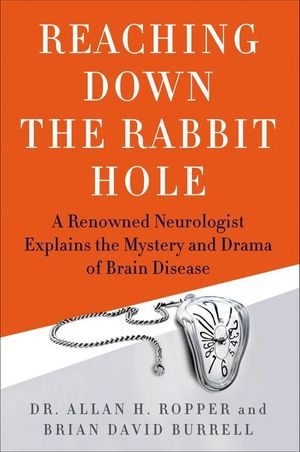Reaching Down the Rabbit Hole
Brian David Burrell Follow this author
Follow this author
Published by St. Martin's Publishing Group
A Harvard neurologist’s “gripping” account of his day-to-day work that “rarely falls into jargon and always keeps the narrative lively and engaging” (Kirkus Reviews, starred review).
Tell the doctor where it hurts—it sounds simple enough, unless the problem affects the very organ that produces awareness and generates speech. What is it like to try to heal the body when the mind is under attack? In this book, Dr. Allan H. Ropper and Brian David Burrell take us behind the scenes at Harvard Medical School’s neurology unit to show how a seasoned diagnostician faces down bizarre, life-altering afflictions. Like Alice in Wonderland, Dr. Ropper inhabits a world where absurdities abound:
• A figure skater whose body has become a ticking time bomb
• A salesman who drives around and around a traffic rotary, unable to get off
• A college quarterback who can’t stop calling the same play
• A child molester who, after falling on the ice, is left with a brain that is very much dead inside a body that is very much alive
• A mother of two young girls, diagnosed with ALS, who has to decide whether a life locked inside her own head is worth living
How does one begin to treat such cases, to counsel people whose lives may be changed forever? How does one train the next generation of clinicians to deal with the moral and medical aspects of brain disease? Dr. Ropper and his colleague answer these questions by taking the reader into a rarefied world where lives and minds hang in the balance.
“Entertaining . . . Like an episode of the popular television series House, the book presents mysterious medical cases . . . In the hands of a lesser writer, this book might have been nothing more than a collection of colorful tales about the many ways a human brain can break down. But Dr. Ropper and Mr. Burrell manage to tell a more profound story about the value of men over machines.” —The New York Times Book Review
“A captivating stroll through the concepts and realities of neurological science.” —Publishers Weekly
“A must-read . . . each chapter reads like a detective story . . . This is medical writing at its best; in the tradition of Rouche, Lewis Thomas, and Oliver Sacks.” —V. S. Ramachandran, New York Times–bestselling author of The Tell-Tale Brain
Tell the doctor where it hurts—it sounds simple enough, unless the problem affects the very organ that produces awareness and generates speech. What is it like to try to heal the body when the mind is under attack? In this book, Dr. Allan H. Ropper and Brian David Burrell take us behind the scenes at Harvard Medical School’s neurology unit to show how a seasoned diagnostician faces down bizarre, life-altering afflictions. Like Alice in Wonderland, Dr. Ropper inhabits a world where absurdities abound:
• A figure skater whose body has become a ticking time bomb
• A salesman who drives around and around a traffic rotary, unable to get off
• A college quarterback who can’t stop calling the same play
• A child molester who, after falling on the ice, is left with a brain that is very much dead inside a body that is very much alive
• A mother of two young girls, diagnosed with ALS, who has to decide whether a life locked inside her own head is worth living
How does one begin to treat such cases, to counsel people whose lives may be changed forever? How does one train the next generation of clinicians to deal with the moral and medical aspects of brain disease? Dr. Ropper and his colleague answer these questions by taking the reader into a rarefied world where lives and minds hang in the balance.
“Entertaining . . . Like an episode of the popular television series House, the book presents mysterious medical cases . . . In the hands of a lesser writer, this book might have been nothing more than a collection of colorful tales about the many ways a human brain can break down. But Dr. Ropper and Mr. Burrell manage to tell a more profound story about the value of men over machines.” —The New York Times Book Review
“A captivating stroll through the concepts and realities of neurological science.” —Publishers Weekly
“A must-read . . . each chapter reads like a detective story . . . This is medical writing at its best; in the tradition of Rouche, Lewis Thomas, and Oliver Sacks.” —V. S. Ramachandran, New York Times–bestselling author of The Tell-Tale Brain
BUY NOW FROM
COMMUNITY REVIEWS

